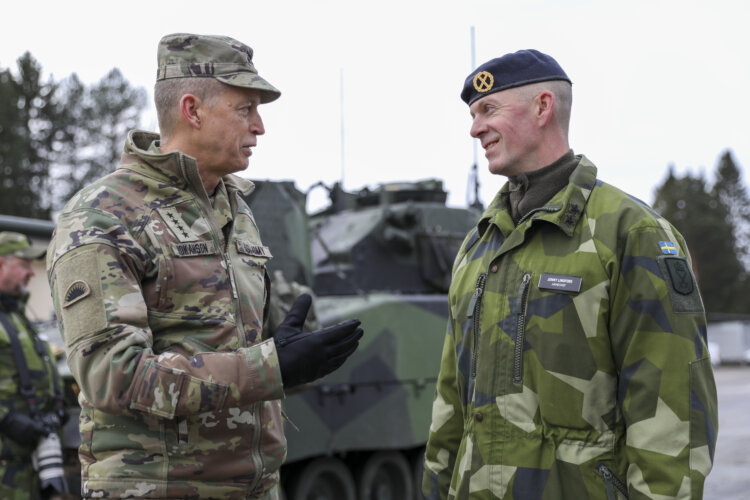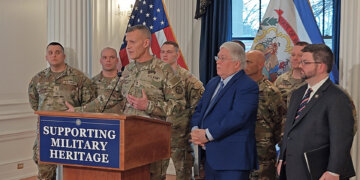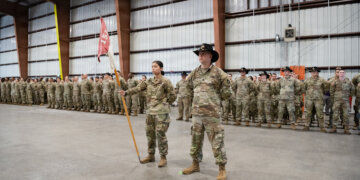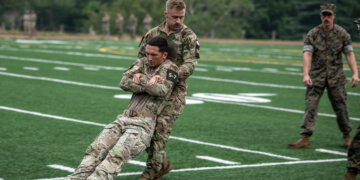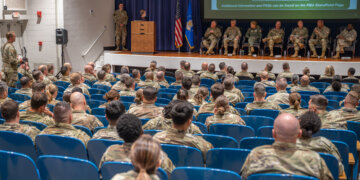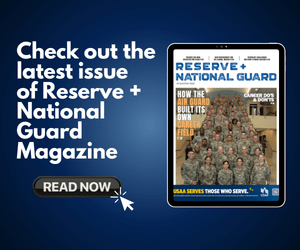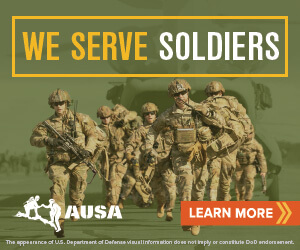A program that pairs the National Guard in the states and territories with foreign allies and partners is set to grow by several nations this year, the National Guard’s top officer announced March 7.
Finland, Palau, Saudi Arabia, Sierra Leone, Sweden and Tanzania will be added to the Defense Department National Guard State Partnership Program in 2024, Army Gen. Daniel Hokanson, the 29th chief of the National Guard Bureau, told a forum of defense and industry leaders.
“Freedom and democracy are American values — but we can’t uphold them alone,” Hokanson said during his address to the McAleese Defense Programs Conference.
“Instead, we must tend to our networks, nurture our alliances and invest in the partnerships that may one day make the difference between chaos and stability, authoritarianism and democracy, or victory and defeat,” he said.
The State Partnership Program formally pairs a state’s National Guard with its partner nation’s military focused on security cooperation. Deeper relations often follow.
For more than 30 years, National Guardsmen have built enduring connections with foreign counterparts through the SPP. Hokanson said the program is one of the most productive, cost-effective security cooperation programs the United States has to offer.
The program began after the collapse of the Soviet Union. The Guard was chosen to help former Soviet states reform their militaries and move toward civilian control of their armed forces.
“Because of our legacy as state militias — and because it would seem less provocative to Russia at the time — the National Guard was the obvious choice to lead these engagements,” Hokanson said.
Positioned in 2,800 U.S. communities, the Guard is also experienced with disaster response, search and rescue and civil-military relationships — focus areas of most SPP affiliations.
The CNGB cited the Guard’s ongoing training assistance with Ukrainian troops as but one SPP success story. Since Russia’s unprovoked invasion in 2022, National Guardsmen have trained more than 7,500 soldiers from 19 Ukrainian battalions across Europe.
This training has helped Ukraine thwart Russia’s advances. The seeds were sown in 1993 when the California Guard and Ukraine were paired in the SPP and began training together. Some of the first calls out of Ukraine in February 2022 were to National Guardsmen.
READ MORE: Ukraine-California National Guard relations reveal human side of State Partnership Program
Today, there are 100 nations in every geographic combatant command paired with the 50 states, three territories and Washington, D.C. The newly announced partner nations will be paired with states in the coming months, a process subject to DOD, State Department and combatant command input and approval.
“The pairing of a state with a nation is not random,” Hokanson said. “Demographics, economics and military size and composition are all factored in. This helps establish a sense of commonality and to make the partnerships beneficial for both parties.”
In recent years, Guardsmen have conducted about 1,000 training exchanges with their foreign counterparts annually, focusing on everything from peacekeeping operations to NCO development, lifesaving techniques and cyber defense.
In 2023, more than 9,000 Guardsmen completed almost 1,500 engagements worldwide — a testament to the program’s success and relevance.
“It’s about mutually beneficial relationships where we learn from each other,” Hokanson said. “Each of our partners is really good at a few things, and so are we. The National Guard is building partners and allies for our nation, and in turn, we’re helping them build capability and capacity for the good of their nation.”
The SPP enables between a quarter and a third of U.S. security cooperation engagements with just 1% of the nation’s security cooperation budget. The numbers tell a small part of the SPP story, but Hokanson said the best stories are about the people involved and the relationships they form.
“The success of these partnerships is built on relationships that endure across decades, spanning the entire duration of careers,” the general said. “As their careers progress, those relationships endure.
“When it is time to train, time to respond, or time to fight, our Guardsmen and our partners build on existing relationships of trust and respect. When called, we stand shoulder-to-shoulder with friends, not strangers.”
This article was written by Sgt. 1st Class Zach Sheely, National Guard Bureau.
Read comments



